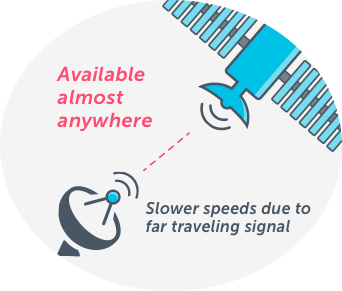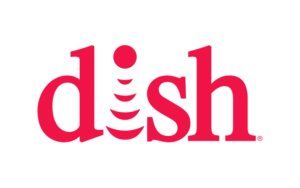
Satellite has been around since the 1970s, and it hasn’t changed much in recent years. There are really only two major options to choose from, DIRECTV and DISH. Although satellite TV has declined in popularity as streaming platforms like Netflix and Hulu have hit the scene, it’s not dead yet. The day of huge backyard satellite dishes may have passed, but you can still drive around almost any suburban neighborhood and spy a couple of tiny rooftop satellite dishes.
Why would I want satellite TV?
Satellite TV is primarily seen as an alternative to cable TV. If cable providers don’t serve your area, satellite TV is often one of the only options to get access to channels like HBO® and CNN.
But there are more differences between cable and satellite than just having a dish on your house. Cable TV is much less likely to be affected by weather conditions than satellite is. Satellite plans are often cheaper than cable, but they almost always come with a one- to two-year contract, whereas it’s possible to find cable plans that go month to month. In urban areas with a lot of options, there are often better ways than satellite TV to get the channels you want.
Where satellite TV really shines is in rural areas. If you already get your internet service via a satellite internet provider like Viasat or Hughesnet, signing up for satellite TV might be a good idea. Why? Although you can watch many of the same shows and stations on streaming apps that you can on satellite TV, streaming video requires a lot of data and satellite internet plans usually have low data caps. Paying for a separate satellite TV service is often cheaper than paying for more satellite data on your internet plan. It can also give you smoother video playback than streaming, which is prone to buffering and lag when playing over a satellite internet connection.
What are the best satellite TV providers?
There have generally been only two choices when it comes to satellite television: DIRECTV and DISH. Both providers have pros and cons, but the biggest difference probably comes down to the channels they offer. If you’re getting satellite TV to watch one or two channels in particular, you’d better make sure that you sign up for the service that offers them.
DIRECTV
DIRECTV is owned by AT&T, which means that if you already have AT&T phone or internet service (or are thinking about getting them), bundling DIRECTV might be a cheap and easy way to get satellite TV.
DIRECTV also offers two years of HBO Max to new subscribers, along with other popular cable channels like CINEMAX®, Paramount+ Premium, and STARZ®.
There are also a few additional perks for those who have both DIRECTV and AT&T wireless. Customers who have both services can stream DIRECTV shows over their mobile devices without having that data count toward their streaming allotment. If you watch a lot of TV on the go, this might be the plan for you.
DIRECTV has the best premium content among satellite TV services, but it comes at a cost. DIRECTV is a bit more expensive than DISH, especially if you’re paying for all the premium channels like HBO. Though the difference in cost may still not be huge, DIRECTV’s monthly cost goes up after the first year. You’ll have to decide if the higher price is worth it to you.
DISH
DISH (formerly known as DISH Network) is all about customer value. It offers affordable TV plans and provides additional perks for its customers, which has not gone unnoticed. The 2019 J. D. Power Customer Satisfaction Survey ranked DISH as the best residential television provider overall in every region in the United States. It’s worth noting that DISH wasn’t just going up against DIRECTV in this survey, but it was also against cable providers as well. That means it beat out providers like Xfinity, CenturyLink, and Spectrum.
DISH also showcases its Hopper 3 DVR, which can record 16 shows at once and has enough space to hold over 900 standard-definition (SD) movies. This might be overkill for your average viewer, but if you’ve ever been watching TV and thought to yourself “Man, I hope I’m not missing 15 other awesome shows right now,” my friend, you are in luck.
The main drawback to DISH Network is that it doesn’t offer as many channels as DIRECTV. That said, its 290 channels are certainly nothing to sneer at, and DISH customers can still get channels like Paramount+ Premium, STARZ, and ESPN, and CINEMAX. You are going to miss out on HBO and some of the other premium channels offered by DIRECTV. However, if these channels aren’t a big draw for you, DISH could still give you the channels you want with a better price and better customer service. That’s a win-win.
DISH vs. DIRECTV: Which one is better?

-
Premium channels
-
Highest monthly cost
Best premium content

-
Good selection of channels
-
Good DVR
-
Fewer premium channels
Best value
When choosing a satellite TV provider, the main thing to consider is the channels you want. If you’re getting satellite TV so you can watch ESPN and then sit back and get caught up on Westworld, there’s really no choice. Go with DIRECTV.
But if you can find all the channels you want on DISH, chances are you can get them cheaper along with all the benefits of its great customer service. There are still reasons you might consider going with DIRECTV over DISH—especially if you want to bundle its services with AT&T internet and phone service. But as a standalone satellite service, DISH is the better value.
You should also consider other options that might be available as alternatives to satellite TV. If you’re in the market for more than just the basics, HBO and most other premium cable channels have their own streaming apps. They can also integrate into other streaming services, like Hulu. If you have access to fast and reliable internet service with no data caps, streaming these channels is both cheaper and more convenient than signing a contract for satellite TV service.
Can I get free satellite TV?
You can get hundreds of satellite TV channels for at no cost using a Free to Air (FTA) satellite receiver. An FTA receiver allows you to pick up satellite transmissions but only those that are unencrypted. Other than the cost of buying and setting up your receiver, FTA satellite is completely free—forever.
Not surprisingly, premium satellite channels are encrypted, so FTA satellite TV won’t give you channels like HBO or ESPN. But it will give you access to an eclectic assortment of live TV broadcasts in a wide variety of languages. Since these transmissions are unencrypted, you can legally access any one of them without any restrictions.
FAQ about satellite TV
How does satellite TV work?
Satellite TV is broadcast from communications satellites in orbit around the earth to your receiver (satellite dish) on your home. Since it doesn’t require any cables or other ground-based infrastructure other than a satellite dish, you can get satellite TV pretty much anywhere. This makes it a particularly attractive option in rural areas that aren’t wired for cable TV or high-speed internet connections.
What’s the difference between satellite TV and cable TV?
Both satellite TV and cable TV have pros and cons. Satellite is available anywhere in the US and customers can choose any provider. Cable is available only in areas where providers have built out their network infrastructures, and you’re limited to providers that are available in your area.
Satellite TV is also usually more of a long-term investment than cable TV. Satellite TV plans typically have longer contracts, usually requiring you to sign up for two years up front. As with internet service, it’s often possible to transfer your service to a new address if you move, as long as your new home allows you to have a satellite dish installed. Still, if you’re a renter or are considering moving in the next year or two, you might want to avoid satellite TV simply because of the early cancellation fees.
What service disruptions does satellite TV deal with?
Generally, satellite TV is pretty reliable; however, unlike cable, satellite TV signals can be disrupted by bad weather. Snow can be particularly disruptive. It can block your signal if it piles up on the dish, causing alignment problems. If you have snow on your dish, gently sweep it away or wait for it to melt if it’s too high on your house. Never scrape your dish or pour water on it—that might damage the dish.
Storms can also be a problem for satellite dishes, depending on where your dish is installed. Strong winds can topple satellite dishes that have been improperly installed, and even properly installed dishes can become misaligned in strong winds. If your connection is still spotty after a storm ends, you might want to have your dish alignment checked. If your dish is high on your roof or on a pole, you might want to call a professional to deal with this problem.
Lightning strikes are also a problem for satellite dishes, although if your dish is struck by lightning, there’s not much you can do. You’ll have to just replace it.
Satellites can also suffer from “sun outages” when the sun lines up directly behind the satellite in orbit. Since communication satellites are placed in geostationary orbit and, thus, are always found in the same point in the sky, you will experience sun outages twice a year: once before the spring equinox (usually in February or March) and once after the fall equinox (usually in September or October).
What’s the difference between satellite TV and satellite internet?
Both satellite internet and satellite TV transmit information to the dish on your house from an orbiting satellite. The main difference has to do with your provider and how your plan works.
With a satellite internet plan, you’re basically paying for data from either Viasat or Hughesnet. More expensive plans offer you more data each month, and few things eat through data like streaming video. If you sit down every day after work and turn on Netflix on a satellite internet connection, you’re going to burn through your data in no time.
By contrast, when you sign up for satellite TV, you’re paying for channels. More expensive plans have more channels, and it could cost you quite a bit to get premium channels like HBO. But once you’ve paid for your top-tier package, you can watch HBO as much as you want. There aren’t any data restrictions.
If you connect to the internet via satellite, we highly recommend that you sign up for satellite TV rather than streaming over your internet connection. Paying for a separate service isn’t ideal, but it will save you massive amounts of data.
What’s the future of satellite TV?
Although it’s been around for almost 40 years, satellite TV has seen a sharp decline in customers over the last few years. Satellite TV providers have lost hundreds of thousands of customers every year as people have switched to streaming services like Netflix and Hulu. Most premium channels these days have their own streaming services that don’t require an entire cable or satellite TV package.
Although satellite TV is certainly past the peak of its popularity, it’s not going away anytime soon. For many people living in rural areas, it’s still the only option. Still, there could be major changes. There’s talk of a merger between DISH and DIRECTV, which would eliminate any choice for satellite TV customers. In any case, these developments aren’t great news for people who depend on satellite TV to stay connected to news and entertainment.
Looking further toward the horizon, there could be an even bigger disruption to satellite TV: 5G.
What does 5G mean for satellite TV service?
One hopeful development on the horizon is the rollout of 5G wireless networks. While current cell phones are no replacement for home internet, 5G networks will be capable of surpassing many other kinds of connections, including satellite, in terms of speed, reliability, and latency. This could be especially impactful in rural areas.
While 5G networks would technically replace satellite internet services, not satellite TV, the two fates are deeply intertwined. AT&T has admitted that it is no longer marketing DIRECTV, and it’s instead pivoting to focus on livestreaming packages. AT&T won’t be pulling the plug anytime soon, but it will continue to sell DIRECTV to “more rural or less dense suburban areas” where streaming services are less practical. Rural 5G would kill two birds with one stone.
Of course, there are a lot of barriers to rural 5G. 5G has faster speeds and higher capacity than 4G networks, but it travels only half as far, which means you need a lot more transmitters to reach the same area. There are still large areas of the US without 4G coverage, so 5G coverage won’t happen without significant government investment. Even in a best-case scenario, 5G isn’t an imminent solution. It will be at least several years before 5G is a practical replacement for other forms of broadband in urban areas, and rural areas will have to wait even longer.
Although the US doesn’t have the greatest track record for investing in rural infrastructure, there are still reasons to be optimistic. The FCC has already suggested plans for establishing funds for 5G development in rural areas. Additionally, the White House put out a briefing which stated that “The President is committed to ensure that rural Americans are not left behind and that their communities have access to safe and reliable high-speed broadband” and that the President “is committed to the development of reliable 5G and ensuring the United States remains the global leader in technology and innovation.”
This certainly doesn’t make any of the barriers to reliable 5G less daunting, but it is a significant shift in the way that we think about telecommunications. So, this is certainly something satellite TV and internet customers should be keeping an eye on in the future.